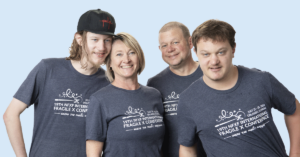About the Study
Who can participate?
Individuals with a confirmed diagnosis of fragile X syndrome and intellectual disability who are 26 or older may be eligible to participate.
What will happen in the study?
If the individual qualifies and decides to be in this research study, they will come to the MIND Institute at UC Davis (or an alternate research site including Cincinnati, OH; Denver, CO; Chicago, IL; Bethesda, MD) for one 5-hour visit day, and potential for a one-hour follow-up visit four weeks after the first visit. Home visits may also be accommodated.
The following is a list of some of study procedures and assessments that will happen during the study; Stanford-Binet Intelligence Scales, 5th edition (SB5), NIH Toolbox Cognition Battery, dementia-sensitive aging battery, Caregiver Vineland Adaptive Behavior Scales 3rd Edition Interview, other caregiver reports
What are the good things that can happen from this research?
Although there are no direct benefits to participation in the study, contributing to this research will provide crucial information for better understanding cognitive profiles and trajectories of aging adults with intellectual disabilities.
There will also be an opportunity for feedback and discussion of participant assessment results.
What are the bad things that can happen from this research?
There are no immediate risks to participating in this study. The length of the visit, and the nature of the cognitive testing may cause minor frustration or fatigue.
There may be other risks that we do not know about yet.
Will I or my child be paid to complete this study?
Participants receive a $100 gift card every visit.


